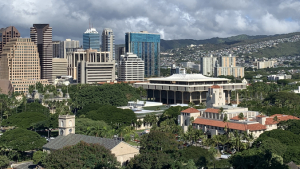Boosting voter turnout, increasing public trust in government and reducing corruption are some of the benefits of using public funds to finance political campaigns, according to public campaign financing advocates. Hawaiʻi has had a system of partial public financing for more than 40 years, but the amount of candidates who have participated and the amounts disbursed have both diminished since the mid 1990s.
According to data from the Hawaiʻi Campaign Spending Commission, in 1994 the program disbursed $1.7 million in inflation adjusted dollars. In 2022, just $71,000 in funds were given to 15 candidates.

A new University of Hawaiʻi Economic Research Organization (UHERO) brief by Colin Moore explores possible solutions to create a more robust public campaign financing system. Moore is associate professor of UHERO and the Matsunaga Institute for Peace, and the chair of UH Mānoa’s School of Communication and Information.
Concerns about the corrupting influence of money in politics, including in Hawaiʻi, have led to renewed interest in public campaign financing. According to Moore, Hawaiʻi’s current program has extremely low rates of participation because the level of public funding is too low and the rules are complex and confusing.
Advocates argue that public campaign financing can: encourage electoral competition; reduce overall spending; boost voter turnout and participation in the electoral process; equalize resources available to candidates; encourage more direct engagement with voters; increase public trust in government; reduce corruption; and foster public policies that more closely reflect the needs of average citizens.
After reviewing decades of political science research and current public funding programs across the country, Moore provides three possible options:
- Transform the current system into a supermatch program. This option would follow the recommendations of the House Commission to improve standards of conduct, but with a much more generous match than the $2 proposed by the commission. Following New York City, Hawaiʻi could adopt an $8 match for contributions up to $100, while increasing the maximum amount of public funds available to a far greater percentage of the total expenditure limit for each office. In New York City, candidates are eligible to receive up to 89% of the total expenditure limit in government campaign funds. If Hawaiʻi adopted a similar policy, these public funds, when combined with the money raised through qualifying donations, could provide sufficient resources to run a competitive campaign.
- Create a block grant program. State Sen. Karl Rhoads has introduced a bill to provide qualifying candidates with grants that approximate the spending of a typical incumbent. Under his proposal, candidates could qualify for public funds that range from $20,000 for Office of Hawaiian Affairs candidates, $50,000 for House candidates, $100,000 for Senate candidates, and $2.5 million for gubernatorial candidates. A greater percentage of the money would be given to candidates in the primary than in the general to recognize that many of the most closely-fought contests in Hawaiʻi occur during primary elections. Advocates of this proposal estimate that it could cost as much as $25 million per year. Ultimately, it is difficult to estimate how many candidates would qualify for this program, but the experience of other block grant states suggests that the costs would be manageable. Connecticut’s program, for example, offers generous levels of funding and has a high participation rate, but cost only $13.5 million during the 2020 election year.
- Distribute campaign vouchers. Hawaiʻi could create a voucher program similar to the one currently in place in Seattle by providing four vouchers worth $25 each to every registered voter in the state. Although this system demonstrated the most impressive results in increasing electoral competition, it is also the most difficult to administer. Seattle uses paper vouchers, which must be gathered by campaigns and redeemed for public funds. Providing administrative oversight and security for such a system would likely require more resources and personnel for the Campaign Spending Commission. Although the cost of this program could be extremely high if all registered voters redeemed their vouchers, the relatively low rates of participation in Seattle suggest that it would be manageable. Assuming a similar rate of participation in Hawaiʻi, the price of this program would be approximately $4.3 million per election.
“Any one of these policy options would likely create more political competition by leveling the playing field and could be supported by a relatively modest appropriation from general funds,” according to the brief. “Public campaign financing programs may not deliver all of the benefits promised by advocates, but they can be an effective investment in local democracy.”
Read the entire brief on UHERO’s website. UHERO, the School of Communication and Information and the Matsunaga Institute for Peace are housed in UH Mānoa’s College of Social Sciences.

